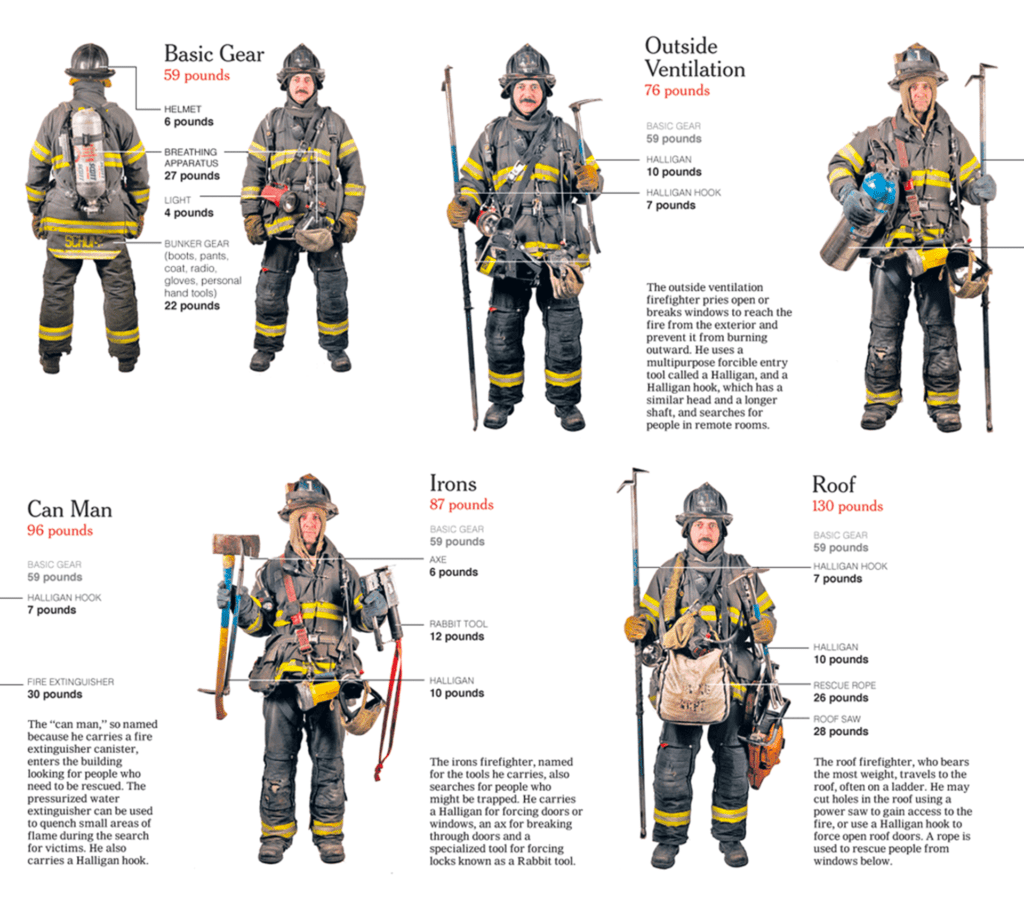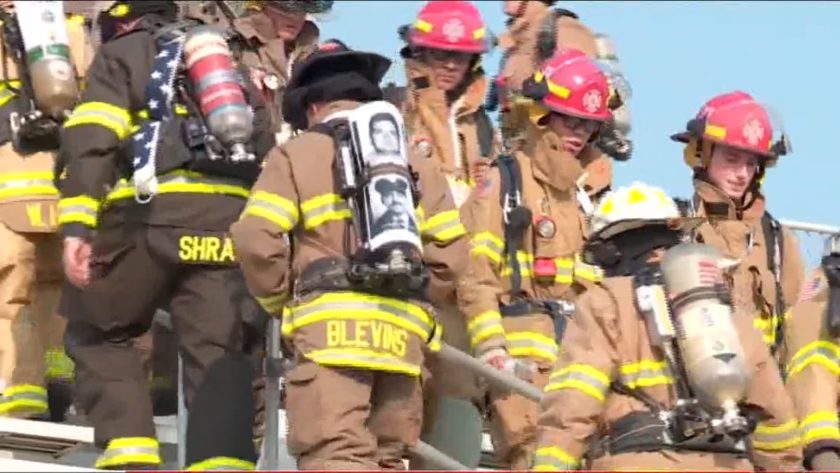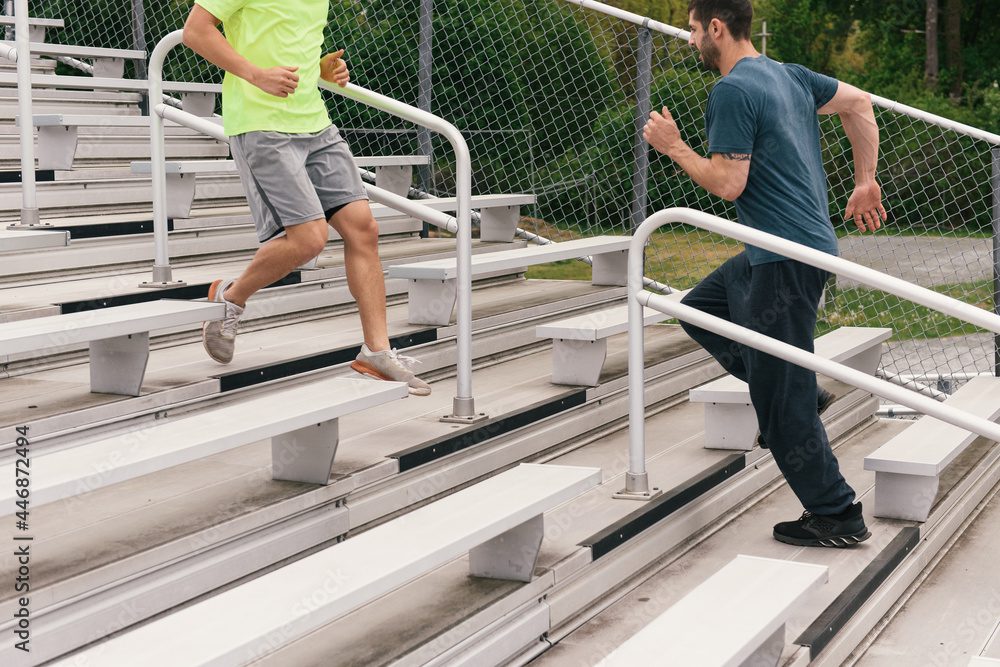It has been 20 years since the September 11 attacks. Across the country, people are finding ways to honor the victims and reflect on the day. In that attack, 343 FDNY firefighters selflessly gave their lives in the World Trade Centers. Here’s a way to never forget our fallen firefighters and to benefit our health as well.
The 9/11 Memorial Stair Climb
9/11 Memorial Stair Climb is a way to never forget one of the most tragic days in American history and to honor the 343 FDNY firefighters who lost their lives on 9/11 in the World Trade Centers. Thousands of first responders around the country participate in 9/11 Stair Climbs.
They climb 110 flights (or 2,200 steps), which symbolizes the heroic ascent that FDNY firefighters took on Sept. 11, 2001. The Stair Climbs are NOT timed race events.
The Goal of the Stair Climb
- To complete the Fallen Firefighters’ journey through dedication, training and physical fitness.
How Heavy Was the Firefighters’ Gear on 9/11?
The firefighters that climbed the twin towers that day were carrying upwards of 100 pounds that included items, such as:
- Helmet, boots, coats, pants, gloves, extra air bottles
- Ax, radio, and extra flashlights, and possibly a thermal imaging camera

How to Participate
Raised to date: $68,515.34 (goal: $75,000).
- You can donate to a climber, team or team member OR
- You can register as an individual climber, team captain, or team member ($50, age 13 & older)
- All participants receive an event t-shirt.
Live Stair Climbs
There are no local Northern California live events, but you can host one. 9/11 Stair Climbs are coordinated by local volunteers. Currently, the only California event is near San Diego (Imperial, CA). Live events are organized in Washington, Pennsylvania, Texas, New York, Missouri, and Washington, DC.
Be a Virtual Stair Climber, Virtual Bike Rider, or Supporter
If you can’t attend an event in person, you can participate virtually. Be sure to complete the activity between Sept 11 and Oct 31, 2021.
There are several ways you can participate virtually.
- You can stair climb 110 flights (about 2 miles). Climb in places like in a gym on a stair climbing machine or stadium bleacher or at home.
- You can run or walk 9.11 km (5.66 miles)
- You can bike ride 3.43 miles.
- You can be a “supporter”. A supporter is someone who may not be able to physically complete the stair climb, but can provide support for a buddy who is climbing.
Registration fee for a supporter is $50; virtual stair climber or bike rider is $35. Participants get an event T-shirt.
NOTE: StairMaster, an iconic brand of stair climbing fitness equipment, has a virtual team that’s accepting members.
How Long Does It Take to Climb 110 Flights of Stairs?
- An average of two hours.
For More Information
NationalStairClimb.org is the official FDNY National Stair Climb in partnership with the National Fallen Firefighters Foundation.
Stair Climb for your Health
Stair climbing improves cardiorespiratory fitness. It is officially classed as a “vigorous” form of exercise. Stair climbing is a more POWERFUL form of walking because it:
- Requires you to pull your weight against gravity.
- Requires more effort which means you accrue health benefits more rapidly.
- Burns 2-3X more energy (even at a slow pace) than walking on a flat surface at a brisk pace.
How to Reduce Mortality and Stop Middle-Age Weight Gain
- Climbers: Men that climb 8 or more flights per day decrease death rate by 33% compared to sedentary men. (Harvard Alumni Study)
- Walkers: Men that walk 1.3 miles/day decrease death rate by 22%.
- Climb stairs an extra 2 minutes per day — Studies show it can help stop middle-age weight gain.
- Climb 33 flights of stairs a day — According to a study published in the British Journal of Sports Medicine, regularly walking up 33 flights (about 400 steps) can increase endurance 17% in VO2 max (the maximum amount of oxygen you can take in during exercise).
Why Walking Down Stairs Can Be More Difficult
For some people with knee issues, walking DOWN stairs may be more challenging. That’s because when going down stairs, requires greater knee flexion.
How to Train
Don’t attempt to charge up 110 flights of stairs or even several long flights of stairs without a warm-up and when you’re not in condition yet.
- Start at a slow, steady pace.
- Begin with just a flight or two.
- Add more flights as you improve.
- Take the stairs whenever possible.
- Wear comfortable shoes. Avoid wearing heels.
- If you have a long climb, walk part way, then switch to an elevator.
- Use the railing for balance (especially going down) BUT try not to use your arms to “hoist you up” the stairs.
- Like any strenuous exercise, don’t attempt the stairs if you don’t feel well or after eating a heavy meal.
![]() Karen’s Fit Tip: Before starting any type of physical activity (particularly a vigorous one), be sure to get clearance from your physician.
Karen’s Fit Tip: Before starting any type of physical activity (particularly a vigorous one), be sure to get clearance from your physician.
For More Information
NationalStairClimb.org is the official FDNY National Stair Climb in partnership with the National Fallen Firefighters Foundation.
 About the National Fallen Firefighters Foundation (NFFF)
About the National Fallen Firefighters Foundation (NFFF)
The United States Congress created the National Fallen Firefighters Foundation to lead a nationwide effort to remember America’s fallen firefighters. (It is not a federal agency.) Since 1992 (signed into law by George H. Bush), the tax-exempt, nonprofit Foundation has developed and expanded programs to honor our fallen fire heroes and assist their families and co-workers.
- The first stair climb to support the NFFF mission was held on 9/11 in Denver in 2005.
- In 2009, the event opened to the public.
- In 2016, over $100,000 was raised for the NFFF.
NFFF Mission
- To honor and remember America’s fallen fire heroes.
- To provide resources to assist their families in rebuilding their lives.
- To work within the fire service community to reduce firefighter deaths and injuries.


